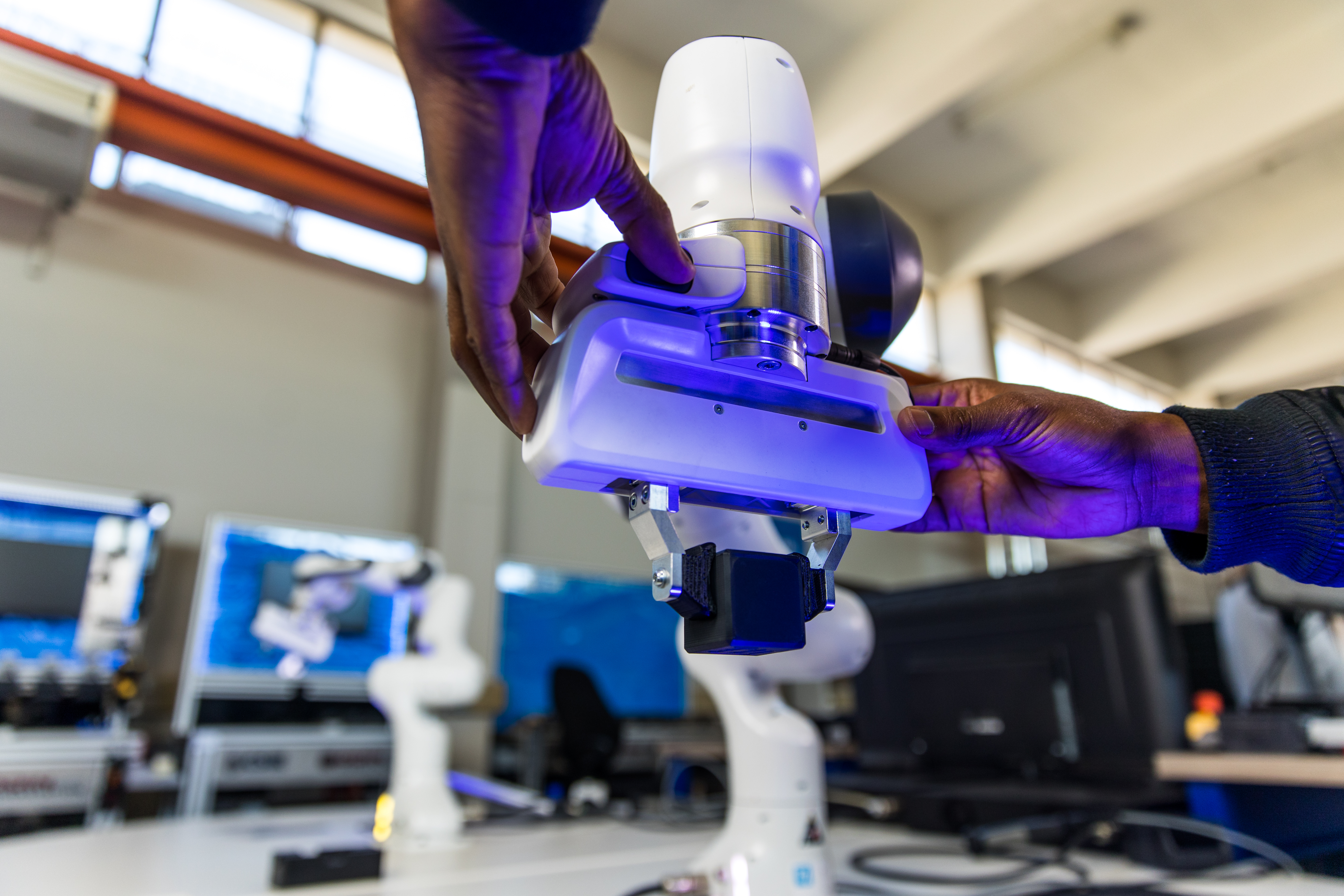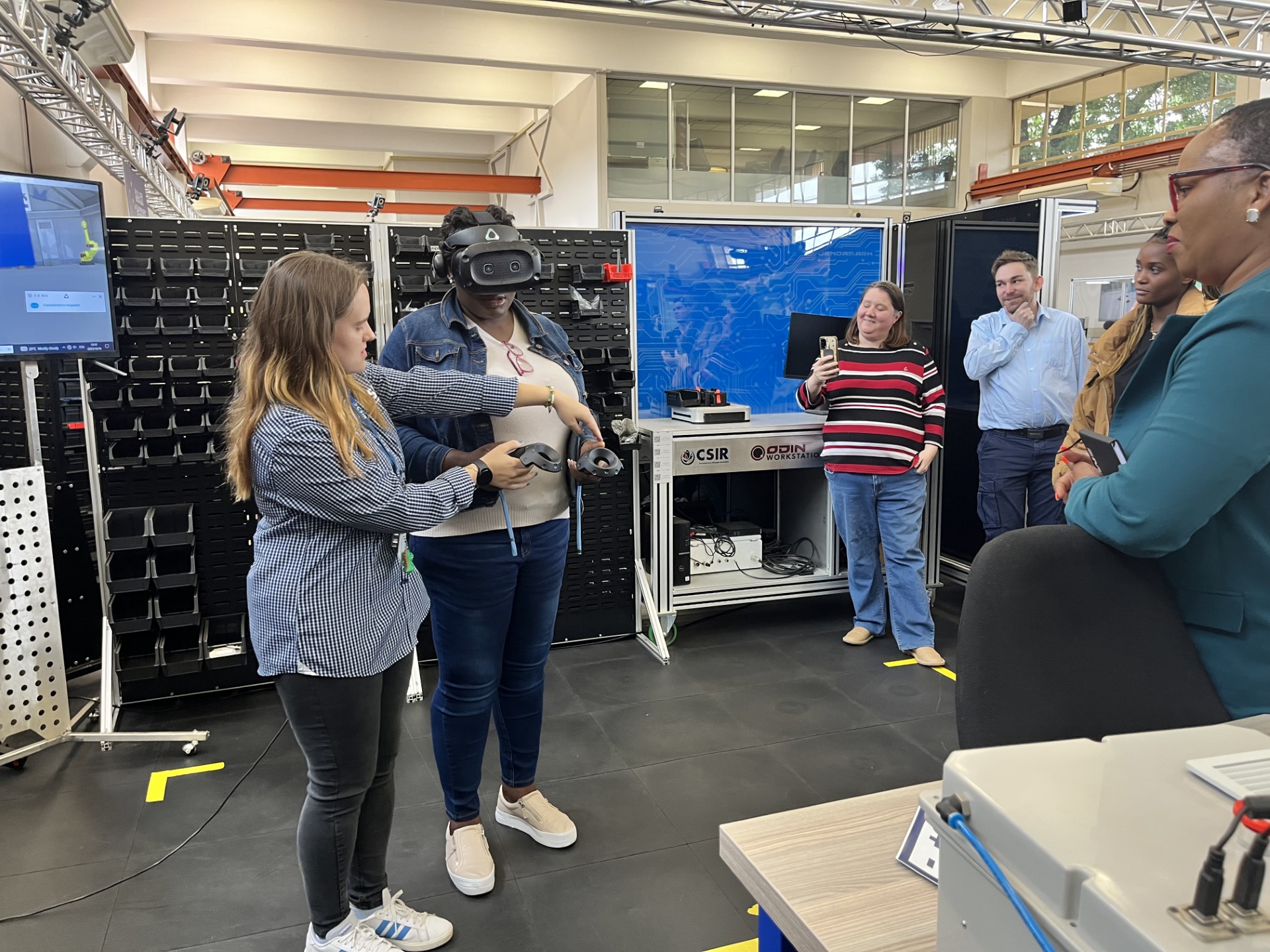Explore the future of industrial work at the CSIR Learning Factory
More than 1 000 people have explored augmented reality, robotics, additive manufacturing, digital twinning and artificial intelligence (AI) through the CSIR’s pilot Learning Factory courses over the past two years, and industry and technical colleges are now adopting the concept.
A learning factory is a space where South Africa’s current and future workforce can explore technologies of the fourth industrial revolution (4IR) by interacting with hands-on practice stations and through online courses.
“For example, we have an area dedicated to three-dimensional (3D) printing, where people can learn the basics of 3D printing and learn to operate 3D printers,” says Dr Belinda Matebese, who leads the CSIR Learning Factory team.
A special production line, made in collaboration with a local industry partner Jendamark Automation, also demonstrates how technology for industrial automation can work with humans using AI and machine learning.
Matebese says the CSIR’s Learning Factory was set up in 2021, in partnership with the Engineering and Related Services SETA (MerSETA), to support skills development and innovation so that South Africa can leverage the opportunities brought by 4IR.

“This Master Learning Factory at our Pretoria campus was established as a pilot to demonstrate how South Africa can equip citizens for decent work in the future, in line with global sustainability goals,” she says.
Matebese says free 4IR courses are also on offer. “We have beginner courses to show how these technologies fit into the South African context,” she says, adding that enrolment has steadily increased. More than 600 enrolled in the first year and over 1 000 since courses began.
"This trend underscores the importance of expanding digital education initiatives to support South Africa’s evolving industrial landscape,” says Matebese, in reference to the United Nations’ Sustainable Development Goal (SDG) 8, which targets decent work and economic growth.
Dr Sunveer Matadin, who manages the CSIR Centre for Robotics and Future Productions, says the CSIR’s Master Learning Factory can be customised or replicated for industries, academic settings or community spaces to boost 4IR skills for better job opportunities, entrepreneurship and innovation.
"The Learning Factory has shown itself to be a model that is customisable and can work across industries and the country. It can bridge the gap between academia and industry."
Plans are in place to set up similar spaces at Technical and Vocational Education and Training (TVET) colleges and industries, says Matebese, and the team wants to expand learning stations to include technologies around renewable energy and agriculture.
Such expansion relies on research from the CSIR team to align with the country's economic needs,and to lead in modern education and innovation. “We have, for instance, conducted a study to see what is required to set up a similar factory specifically for the mining industry in Limpopo,” says Matebese.
The CSIR and MerSETA team are also setting up a pilot learning factory at the East Cape Midlands Technical TVET College. "This builds on previous work with the TVET to identify and address gaps in their curriculum, determine the scope and technology to be included in the Learning Factory and align it with industry needs to support the development of a skills pipeline in 4IR technologies," she says.

"We are creating solutions that focus on people, using technology to help them learn new skills,” she adds. “This way, even people who don't have extensive formal education can learn to work with new technologies."
Matebese says the Learning Factory piloted a training programme for Master of Business Administration students from the Independent Institute of Education (IIE) MSA, where they interacted with some of the application stations (AR/VR), were introduced to blockchain and finished off with an innovation workshop.
“Students highlighted improvements in creative thinking, problem-solving and awareness of 4IR's potential for business opportunities and efficiency,” she says.
One student remarked, "This is something that I can immediately implement into my work environment," which Matebese says reflects the programme's direct relevance to their professional lives.
"The collaboration holds great promise as we harness the best of both worlds: the CSIR's technical excellence and the IIE MSA educational prowess. Together, we are dedicated to pushing the boundaries of skills development and innovation," says Marlene Bogaards, who heads the Research and Postgraduate Studies Unit at IIE MSA.
Matebese invites other members of the public, education institutions and industry to visit the facility by booking online and to enrol for free courses.
The initiative is in partnership with MerSETA, and it addresses SDG 4, SDG 8 and SDG 9.

